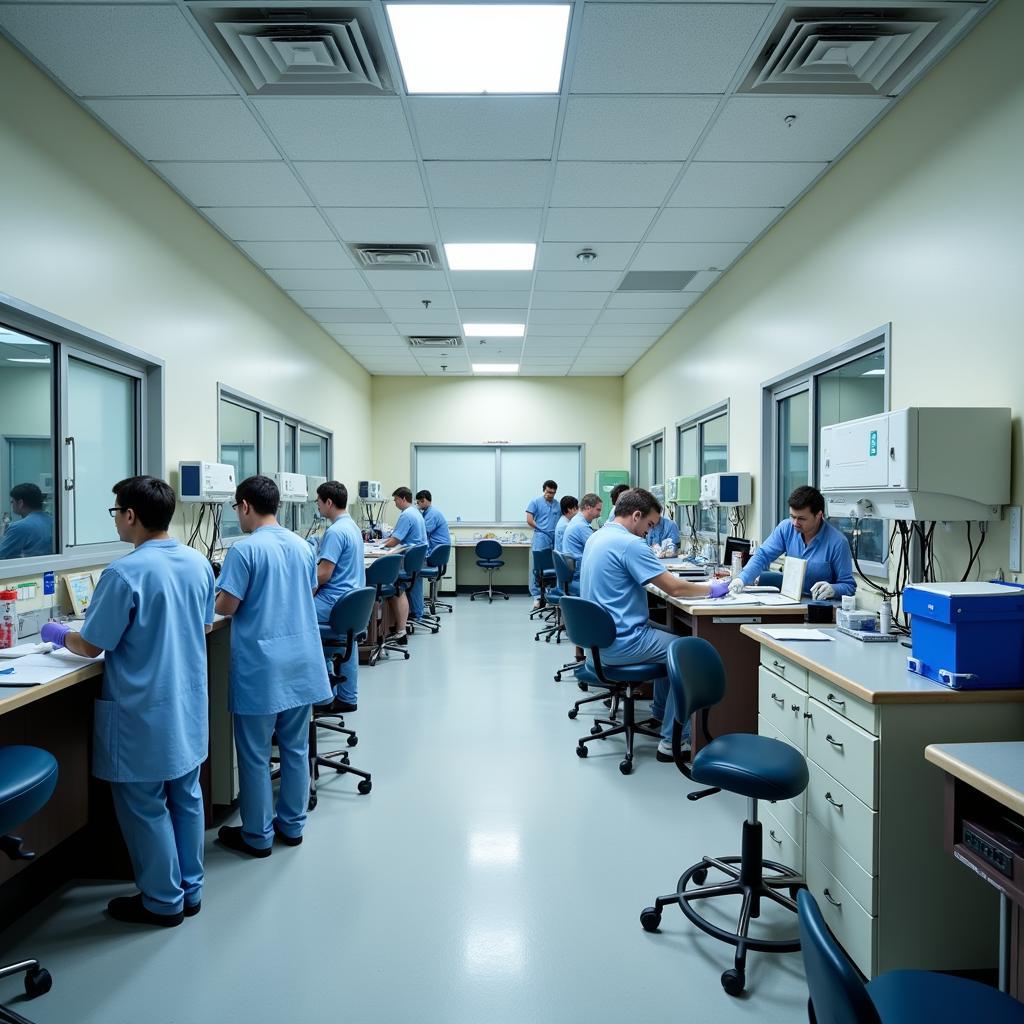Hospital Phlebotomist Jobs offer a fulfilling career path for those passionate about healthcare and patient interaction. These vital professionals are the backbone of clinical laboratories, ensuring accurate and timely blood collection for diagnoses and treatments. This guide explores the world of hospital phlebotomy, from required skills and qualifications to career prospects and salary expectations.
A career as a hospital phlebotomist demands a unique blend of technical proficiency and interpersonal skills. You’ll learn how to master venipuncture techniques while also building rapport with patients, often during stressful or vulnerable moments. This balance makes hospital phlebotomist jobs both challenging and incredibly rewarding.
Are you interested in pursuing a career that combines scientific precision with compassionate care? Then read on to discover everything you need to know about hospital phlebotomist jobs. This guide will cover essential information about the role, including the educational requirements, necessary certifications, day-to-day responsibilities, and potential career growth opportunities. We’ll also delve into the job market outlook and discuss the factors that influence salary expectations.
What Does a Hospital Phlebotomist Do?
Hospital phlebotomists are trained healthcare professionals specializing in drawing blood from patients for various medical tests, transfusions, and research. They work in a variety of healthcare settings, including hospitals, clinics, laboratories, and blood donation centers. A key part of their role involves patient interaction, requiring excellent communication and empathy.
Beyond the technical skill of drawing blood, hospital phlebotomists must meticulously adhere to safety protocols and maintain accurate patient records. This includes properly labeling samples, handling sensitive medical information, and following infection control procedures. Their work is essential for accurate diagnoses and effective treatment plans, making them an integral part of the healthcare team.
Educational Requirements and Certifications for Hospital Phlebotomist Jobs
While a high school diploma or GED is often the minimum requirement for hospital phlebotomist jobs, completing a phlebotomy training program from a vocational school or community college is highly recommended. These programs typically include classroom instruction and hands-on clinical experience. Certification is not always mandatory, but it significantly enhances your career prospects. Check out our resources on hospital jobs with high school diploma for more information on entry-level positions. You may also want to learn more about chambersburg hospital lab.
Several nationally recognized organizations offer phlebotomy certifications, such as the American Society for Clinical Pathology (ASCP) and the National Healthcareer Association (NHA). Certification demonstrates your competency and commitment to the profession, making you a more desirable candidate for employers. For those aiming for higher-paying positions or specialized roles, further education and advanced certifications can provide a competitive edge.
Career Growth and Salary Expectations in Phlebotomy
The job market for hospital phlebotomists is expected to remain stable and even grow in the coming years. As the demand for healthcare services continues to rise, so too will the need for skilled phlebotomists to support diagnostic testing and patient care. While entry-level positions provide a solid foundation, aspiring phlebotomists can explore various avenues for career advancement.
With experience and additional training, phlebotomists can advance to supervisory or managerial roles, specializing in specific areas like therapeutic phlebotomy or blood bank technology. Exploring related careers in clinical laboratory science can also open doors to new opportunities. Salaries vary based on experience, location, and certifications, with experienced and certified phlebotomists typically earning higher incomes. Mercy hospital phlebotomy jobs could be a great place to start your search.
What is the Average Salary for Hospital Phlebotomist Jobs?
The average salary for hospital phlebotomist jobs varies depending on location and experience. Entry-level positions may start around $15 per hour, while experienced phlebotomists can earn over $25 per hour.
Landing Your Dream Hospital Phlebotomist Job
Landing your dream hospital phlebotomist job requires a proactive approach. Networking with professionals in the field, attending career fairs, and actively searching online job boards are essential strategies. Tailoring your resume and cover letter to highlight relevant skills and experience can significantly improve your chances of securing an interview. Consider researching French hospital San Luis Obispo jobs or utilizing a hospital grade vein finder to improve your skills.
During the interview process, emphasize your passion for patient care, attention to detail, and commitment to following safety protocols. Showcase your technical skills and your ability to work effectively as part of a team. Preparation and confidence are key to making a positive impression and securing your desired position.
Conclusion
Hospital phlebotomist jobs provide a rewarding career path for individuals seeking a blend of scientific precision and compassionate patient care. With a growing job market and opportunities for advancement, a career in phlebotomy offers both stability and personal fulfillment. This guide has provided you with the necessary information to start your journey in this exciting field. Are you ready to embark on a fulfilling career? Explore hospital phlebotomist jobs today!
 Hospital Phlebotomy Lab
Hospital Phlebotomy Lab
FAQ
- What skills are essential for a hospital phlebotomist?
- What are the different types of phlebotomy certifications available?
- What is the typical career path for a phlebotomist?
- What are the job prospects for hospital phlebotomists?
- How can I prepare for a phlebotomy job interview?
- What are the continuing education requirements for maintaining certification?
- How do I handle difficult patients or challenging venipunctures?
For further assistance, please contact us at Phone Number: 02437655121, Email: [email protected] Or visit our address: 298 Cau Dien St., Minh Khai, Bac Tu Liem, Hanoi, Vietnam. We have a 24/7 customer service team.